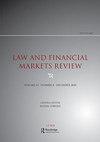W[h]ither Australia? Will Parliament Act?
Q2 Social Sciences
引用次数: 0
Abstract
Australia is replete with commissions and inquiries into egregious behaviour in its financial sector. This author has quantified the effects of those behaviours on individuals and the wider economy. 1 These investigations include Heydon 2 (elimination of unhealthy culture), Hayne 3 (confluence of law and morality) and the Productivity Commission 4 (trust). The most important Hayne recommendations 5 – which would reduce Australia’s international reputation as a regulatory outlier and better reflect community expectations remain unresolved. Confused parliamentary leadership has facilitated corruption of the financial regulatory system which has for many people been an abject disaster. 6 The Australian government must act. It must do so strategically. It must establish the nexus between the intent of the law and its practical implementation for those it purports to serve. Parliament has yet to debate the underlying causes focussing instead on tactical and punitive responses. If it does, then it must confront the distinction between prescriptive statute and principles-based supervision, recognising the power of antecedent fiduciary law. These are philosophical as well as legal questions. Hayne pointed to the need for a framework for the re-integration of the intent and spirit of the law with its statutory manifestations, presently scattered and inconsistent. This paper is that framework. Without it, much of the financial services and products sectors may continue their descent into the Stygian gloom of costly and inconsistent multi-layered bespoke regulation. An unintended consequence of paternalist policy will be fewer market participants, less choice and fewer opportunities to develop financial literacy.是澳大利亚吗?议会会采取行动吗?
澳大利亚对其金融部门的恶劣行为进行了大量的调查和调查。作者量化了这些行为对个人和整个经济的影响。1这些调查包括Heydon 2(消除不健康文化)、Hayne 3(法律与道德的融合)和生产力委员会4(信托)。最重要的海恩建议5——这将降低澳大利亚作为监管局外人的国际声誉,并更好地反映社区期望——仍未得到解决。混乱的议会领导层助长了金融监管体系的腐败,对许多人来说,这是一场悲惨的灾难。6澳大利亚政府必须采取行动。它必须从战略上这样做。它必须在法律的意图和法律对其声称服务的人的实际执行之间建立联系。议会尚未就根本原因展开辩论,而是将重点放在战术和惩罚性回应上。如果它这样做了,那么它必须面对规范性法规和基于原则的监督之间的区别,承认先前信托法的权力。这些既是哲学问题,也是法律问题。海恩指出,需要一个框架,将法律的意图和精神与其目前分散和不一致的法定表现形式重新结合起来。本文就是这样的框架。如果没有它,许多金融服务和产品行业可能会继续陷入成本高昂且不一致的多层定制监管的冥冥之中。家长式政策的一个意想不到的后果将是市场参与者减少,选择减少,发展金融知识的机会减少。
本文章由计算机程序翻译,如有差异,请以英文原文为准。
求助全文
约1分钟内获得全文
求助全文
来源期刊
CiteScore
1.40
自引率
0.00%
发文量
0
期刊介绍:
The Law and Financial Markets Review is a new, independent, English language journal devoted to providing high quality information, comment and analysis for lawyers specialising in banking and financial market issues and to others with interests in legal and regulatory developments affecting the financial markets. Published four times a year LFMR contains articles written by leading experts providing a forum for practical guidance on, as well as reflective and topical analysis of, all major jurisdictions, with a particular focus on the interaction between the law and market practice and behaviour.

 求助内容:
求助内容: 应助结果提醒方式:
应助结果提醒方式:


